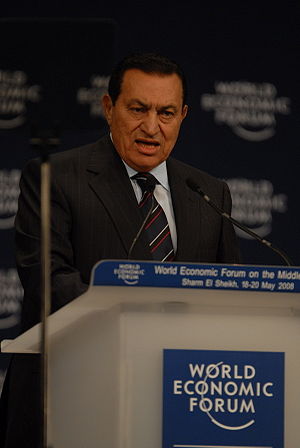 Image via Wikipedia
Image via WikipediaIn the past few days I have read one article after another comparing the revolutions sweeping the Arab world to 1848 Europe. Can we please stop this academic exercise for inflating egos and propounding grand theories for the next thesis or magazine article? There is no comparison, and the attempts to do so are pathetically trying to fit current events into a model based on past history. Aside from being a dubious exercise best left to tenure seeking history and political science professors with nothing to do except selectively seek examples from the past to fit their pet theories, models in general, and historical ones in particular, do not work. They tell us nothing. Like most models, they are based on past events, which require tossing out every exception as an outlier because that would explode the model. Think bell curve. PURE, TOTAL, RUBBISH.
First – the revolutions of the late winter and spring of 1848 occurred solely in Europe – and the western part at that. In Western Europe, the famous barricades were only seriously guarded in France. What would become Germany twenty five years later had some revolutionaries. In March 1848, Hungarians revolted from the Hapsburgs – but so would you under their circumstances. The Netherlands experienced an upheaval and Belgium was created. In none of these countries was there a unifying theme. The economy in German territory was in shambles. People were starving elsewhere. Marx grew up.
The middle class in France did not like the political situation and used, as usual, the poor as cannon fodder. The latter were interested in economic reform and food. By 1849, the middle class and poor in France got neither political reform (wow – universal suffrage for…wait for it….men) nor economic change. Germans took a step toward unification – which would only be solidified twenty-five years later by Bismarck and tested on the unfortunate French. Nothing much else changed. Italy began a long road to unification. The Hungarians were crushed with the help of Imperial Russia (which had no intention of allowing a revolution against monarchies anywhere in Europe having experienced the ultimate result of the same sort of thing in 1789). The Hapsburg Empire continued to stumble along unchanged until 1918. The Ottoman’s were untouched – well, ok the Greeks were pushing back. Russia was largely a bemused bystander. England was untouched as were Spain and Portugal.
After 1848 virtually nothing changed. The poor stayed poor and disenfranchised. Women stayed subservient to the extent that American Tea-baggers can only dream about. Monarchy was triumphant.
So – what does 1848 have in common with the current wave? Not bloody much. Keep your models on the shelf and enter the real world where dismissed improbable events puncture beautiful, coloured academic model balloons.
In the Arab world, the events in Tunisia that surprised everyone were triggered by economic hardship. It has spread to other economically troubled countries. There are two underlying themes – poverty due to lack of employment and political oppression of one degree or another. The atmosphere and events are unique and are not 1848 – but may reflect some of the same results.
First, so far the military has brought security and stability to Tunisia after President _______ left. The military, so far, has brought security and stability to Egypt.
Moammar Gadhafi, umbrella in one hand and his little green bible in the other, has lost his mind if one is to judge by his rambling speeches and insane actions. One son, Saif – the intelligent one – is quickly following down the same path and both, apparently indifferent to killing, are shooting everyone in sight, with mercenaries no less. But, the result will be the same in Libya. The military, who have largely defected to the revolutionaries, will take ultimate control, bringing security and stability.
Bahrain is different – a minority Sunni royalty ruling a Shiite majority. Just like Jordan. The economy at the bottom is what matters and in both it basically sucks. The ruling elite may give up something, but perhaps stay in power. Nothing like the upheavals in Egypt, Tunisia, Libya or Bahrain has affected other Arab states. Word is still out on Morocco and Algeria. One shudders to think what Assad in Syria would do.
But, unlike 1848 - 1849 Western Europe, even in those countries without the people on the streets will need to change; indeed are doing so now. And many changes will be permanent – except perhaps for one. Other than Libya – and that remains to be seen – Egypt and Tunisia have resulted only in a transfer of power. The regimes that were there before are there now. Economic reforms may be coming, and some political reforms – neither of which was really achieved as a result of 1848 – but there seems to have been an attitudinal awakening in the Arab world. You can see it on the streets. Dynasty may be a thing of the past, whether royal or family (something that 1848 never changed) but western concepts of democracy are a long way down the yellow-brick road.
So, kindly stow the pleasant little academic models. They explain nothing and predict less.
Oh. One more thing. The fact that Iran is condemning the killing of demonstrators in Libya would be funny if it was not so pathetic. One can only hope that the clerical regime in Tehran is worried about its own skin.



